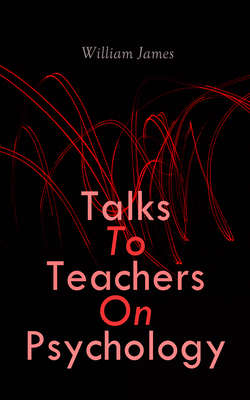Talks To Teachers On Psychology

Реклама. ООО «ЛитРес», ИНН: 7719571260.
Оглавление
William James. Talks To Teachers On Psychology
Talks To Teachers On Psychology
Table of Contents
PREFACE
TALKS TO TEACHERS
I. PSYCHOLOGY AND THE TEACHING ART
II. THE STREAM OF CONSCIOUSNESS
III. THE CHILD AS A BEHAVING ORGANISM
IV. EDUCATION AND BEHAVIOR
V. THE NECESSITY OF REACTIONS
VI. NATIVE REACTIONS AND ACQUIRED REACTIONS
VII. WHAT THE NATIVE REACTIONS ARE
VIII. THE LAWS OF HABIT
IX. THE ASSOCIATION OF IDEAS
X. INTEREST
XI. ATTENTION
XII. MEMORY
XIII. THE ACQUISITION OF IDEAS
XIV. APPERCEPTION
XV. THE WILL
TALKS TO STUDENTS
I. THE GOSPEL OF RELAXATION
II. ON A CERTAIN BLINDNESS IN HUMAN BEINGS
III. WHAT MAKES A LIFE SIGNIFICANT
Отрывок из книги
William James
e-artnow, 2020
.....
"In such a discord of opinions (comprehensible enough at a time of uncertain and groping development), the individual inquirer can only tell for what views and insights he himself has to thank the newer methods. And if I were asked in what for me the worth of experimental observation in psychology has consisted, and still consists, I should say that it has given me an entirely new idea of the nature and connection of our inner processes. I learned in the achievements of the sense of sight to apprehend the fact of creative mental synthesis. … From my inquiry into time-relations, etc., … I attained an insight into the close union of all those psychic functions usually separated by artificial abstractions and names, such as ideation, feeling, will; and I saw the indivisibility and inner homogeneity, in all its phases, of the mental life. The chronometric study of association-processes finally showed me that the notion of distinct mental 'images' [reproducirten Vorstellungen] was one of those numerous self-deceptions which are no sooner stamped in a verbal term than they forthwith thrust non-existent fictions into the place of the reality. I learned to understand an 'idea' as a process no less melting and fleeting than an act of feeling or of will, and I comprehended the older doctrine of association of 'ideas' to be no longer tenable. … Besides all this, experimental observation yielded much other information about the span of consciousness, the rapidity of certain processes, the exact numerical value of certain psychophysical data, and the like. But I hold all these more special results to be relatively insignificant by-products, and by no means the important thing."—Philosophische Studien, x. 121–124. The whole passage should be read. As I interpret it, it amounts to a complete espousal of the vaguer conception of the stream of thought, and a complete renunciation of the whole business, still so industriously carried on in text-books, of chopping up 'the mind' into distinct units of composition or function, numbering these off, and labelling them by technical names.
Table of Contents
.....